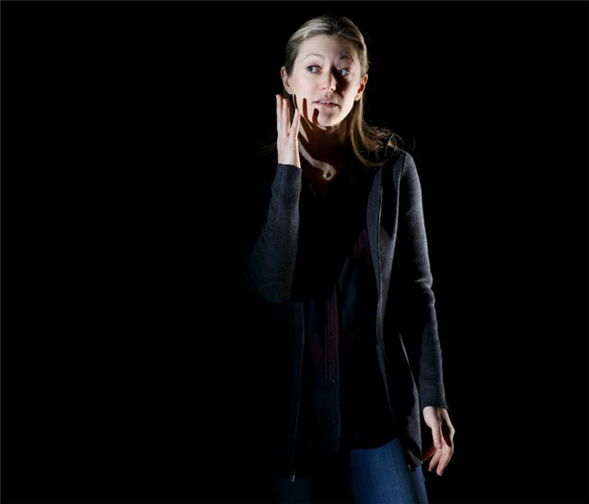Translate Page

In On the Exhale, a striking point of view changes how audiences relate to the character
---
When an unnamed college professor (played by Marin Ireland) admits her fear of being shot by an unhinged student in On the Exhale, it feels both confessional and conspiratorial. She's revealing a poignant secret and showing us her dark side. Yet at the same time, something about the way she expresses herself implicates the audience. This isn't just her anxiety; we share in it, too. And then it hits us: On the Exhale is written entirely in the second person. She never says "I," only "you.""That's been there since the first draft," says playwright Martín Zimmerman, whose one-woman drama is having its world premiere Off-Broadway in Roundabout Theatre's Roundabout Underground series. Plot-wise, it's a personal exploration of how one single mom reacts to a heinous act of gun violence, and how she becomes obsessed with the weapon used to perpetrate it. However, she's arguably a stand-in for all of us since -- regardless of how we feel individually about the hot-button issue -- we've all been touched by the epidemic. Hence the "you."
"People really respond to the second person and I've been told it mimics trauma sufferers' experience," Zimmerman says. "She's not owning her emotions. She's disassociating. She's putting the experience onto us so she doesn't have to deal with the wreckage. There's such a temptation when playing a character dealing with the aftermath of such violence to show the grief, and Marin does not at all. She lives inside the emotional truth of what it means to be completely alienated from your emotional life. She's in denial of the grief through so much of the play, and using the second person facilitates that."
Zimmerman was inspired to pen this harrowing story after the 2012 massacre at Sandy Hook Elementary School. "To me it felt if no legislative action could be taken after that, no action would be taken on gun control ever," he says. "That rage was the seed of the play." But he knew from the outset that he didn't want to simply write an anti-gun screed. To that end, On the Exhale doesn't just track a victim, it also examines the seductiveness of firearms. "It makes a passionate case for gun control but also speaks to the experience of owning and firing a weapon," Zimmerman says. "It acknowledges the connection people have to those devices." For another play he wrote about the Iraq War, Zimmerman spoke to soldiers about their relationship to their firearms and their feedback came in handy here. "One of the most difficult things was the nakedness they felt of not carrying all the time," he recalls. "They felt a part of them was missing when they couldn't feel that weight on them."
Following Chekhov's dramatic dictum that if a gun is visible onstage it must be fired, there are no weapons in On the Exhale. In fact there are no props at all; Ireland relates her character's excruciating narrative in incredible detail, and Rachel Hauck's black hole of a set allows audiences to imagine the events. "A lot of people remark on that void at the back," Zimmerman says. "I love when I hear people say it allows them to visually paint the picture of what's happening."
Of course the lack of obvious stage trappings made the dramatist acutely concerned with what, exactly, makes this a play and not some other type of writing. "The development process has been about figuring out how this works theatrically, beyond reading it out loud," says Zimmerman. "I like how much it compels an audience to listen. It does demand an audience's participation in engaging imagination. In that way it is theatrical. The story in its form cannot exist without the audience. They're her scene partner."
Although Zimmerman acknowledges that in our new political reality there are myriad urgent issues, he hopes that demanding gun control continues to be a priority. "The majority of NRA members believe there should be universal background checks, but the NRA is a corporate lobby that isn't beholden to popular opinion. With certain other issues, popular upset can move the needle a little bit. There's no correlation between what public opinion is on guns and our gun policy. Also, I think the issue of gun violence is hidden inside a lot of other concerns. Obviously it surfaces when there is a mass shooting, but most people killed by guns aren't killed in mass shootings; they're killed because a person had easy access to a gun to kill themselves or a member of the family. Guns facilitate a lot of other kinds of violence."
---
Follow Raven Snook at @RavenSnook. Follow TDF at @TDFNYC.
Top image: Marin Ireland in On the Exhale. Photo by Joan Marcus
TDF MEMBERS: Browse our discounted tickets to theatre, dance, and concerts.